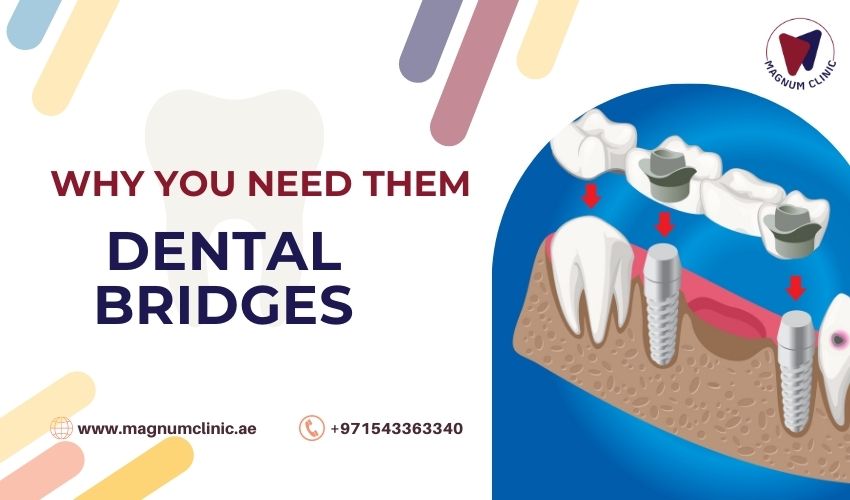Dental Bridges: Why You Need Them, Types, Procedure And Advantages

A missing tooth due to an accident, tooth decay or injuries can cause a gap. It not only affects your dental health but impacts your looks too.
A big thanks to modern dentistry. Neither do you have to perform your daily chores with a gap in your smile, nor will it be difficult while eating.
Will it be worth having dental bridges to fix your missing teeth? Let’s uncloak the facts.
What is a dental bridge?
Comprised of metal, ceramic and a combination of these materials, a dental bridge can fix the gap of a missing tooth. Usually, it is used to fill the gap between one or more missing teeth. In other words, replacing your missing tooth is a restoration procedure.
Why do you need a dental bridge?
- Dental bridges can fill the gap of a missing tooth by replacing the same with false ones. Not just restore your bite, but it will improve the overall teeth shape and experience.
- People suffering from gingivitis, tooth decay or other dental diseases may also suffer from missing teeth.
- Dental bridges can fix birth disorder issues. However, dental bridges need healthy teeth on either side of the gap.
- A dental bridge helps people to restore speech and pronunciation.
- Helps to maintain the face shape
- Helps to readjust your bite during chewing
- Prevents your remaining teeth from moving out of their current position.
Different types of dental bridges
Dental bridges are comprised of different types of materials. However, porcelain is one of the widely used materials for dental bridges. It helps to blend with your natural teeth, which is more aesthetically pleasing. There are four different types of dental bridges. Here you go-
1. Traditional dental bridge
It is made of a false tooth or the tooth being held by dental crowns. It needs to be cemented to each abutment's tooth. Traditional bridges are mainly made of porcelain materials infused with metals to provide firm support. It is one of the popular types of dental bridges. It can be used if you have regular teeth on both sides of the gap.
2. Cantilever bridges
These are almost similar to a traditional dental bridge. A dental crown provides support for a pontic. Generally, this is prescribed for patients with only one natural tooth. According to dentists, cantilever bridges are the best for front teeth compared to back ones.
3. Maryland dental bridge
Maryland dental bridges are also known as resin-bonded bridges. It is best known for fixing the patient’s front tooth. Usually, these bridges comprise similar plastic material encapsulated within a metal frame. It has two free ends to provide space to attach the adjacent teeth. The dentist may install metal attachments with the anchor teeth on the opposing sides during the application. It will support the bridge.
Maryland bridges offer patients a conservative restoration compared to its alternatives. It doesn’t need to reshape adjacent teeth for a crown replacement.
4. Implant-supported bridges
This type of bridge gets support from an implant. It works as an alternative to missing teeth by bridging the gaps where the natural teeth are lacking. It is the strongest bridge type. However, these are complex too.
An implant-supported bridge may require two surgeries-
- For embedding the implants within the jawbone
- The second surgery needs for successful bridge placement.
It may take months to complete the entire procedure.
The procedure of dental bridges
Mostly, dental bridges require three or four sittings. Here is how it works-
Step 1- Preparation of adjacent teeth
It involves the preparation of adjacent teeth by performing the reshaping work. It also requires the elimination of dentin and enamel partly.
Step 2- Digital scanning
Now, the dentist will digitally scan your teeth by creating a model for the dental bridge. The expert will fill the gap with a temporary bridge until the false teeth are prepared.
Step 3- Replacement of temporary bridge
This is considered the last step. Here the dentist will replace the temporary bridge with the permanent one. Also, the dentist will thoroughly check the bridge placement to assess if it requires further adjustments.
Advantages of dental bridge
- Dental bridges don’t require surgery to restore the bite unless you choose an implant. All types of dental bridges can be completed within a stipulated time.
- Dental bridges are more pocket-friendly than dental implants as it finishes quickly
- Dental bridges are durable. It can last for a long time. Compared with dentures, it won’t break during eating/chewing.
- The feel and look of dental bridges are more aesthetic than dentures
How much does a dental bridge cost in Dubai?
It will cost around AED 399-3999 based on the dentist’s experience, specialty, material, and devices.
Reach out to us about bridges
What kind of dental bridge will be suitable for you? We’re here to help you choose the option to complete your smile. If you’re ready to fill the gap caused by your missing tooth, schedule an appointment today! Our experts will examine your current dental health to recommend what type of implant would be best for you.
